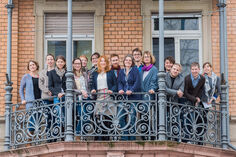INTACT: Individually Tailored Stepped Care for Women with Eating Disorders
Contact: PD Dr. Stephanie Bauer (stephanie.bauer(at)med.uni-heidelberg.de)
Project management: H. Kordy, S. Bauer
Since April 2007, FOST has been coordinating the four-year collaborative project INTACT ("Individually Tailored Stepped Care for Women with Eating Disorders"), which is funded by the EU in the Marie Curie Program and aims to develop and scientifically investigate innovative strategies for the prevention and treatment of eating disorders.
To this end, a total of 14 studies are being conducted at the nine participating centers in eight countries (Germany, France, Portugal, Switzerland, the Netherlands, the Czech Republic, Hungary, and England), in which a wide variety of research methods are being used. For example, the focus in Heidelberg is on the socio-cultural factors of eating disorders, examining the influence of modern mass media such as Internet blogs on risk factors of eating disorders.
At the other study centers, the focus is on genetic studies, therapy progression studies and the investigation of innovative forms of care. The latter consist, for example, of Internet-based programs that allow at-risk individuals and female patients to receive care in a time- and cost-effective manner. These technology-based interventions build on the FOST's expertise of investigating the potential of, for example, email- chat- and SMS-based programs for optimizing mental health care in a large number of studies.
Overall, the INTACT studies cover the entire spectrum from risk factors and prevention to early intervention options and intensive outpatient and inpatient psychotherapy and relapse prevention.
In addition to the scientific objectives, the second focus of INTACT is the training of young scientists: As a so-called "Research Training Network", INTACT aims to train a young European generation of researchers in the field of eating disorders. A total of 17 young scientists who are aiming for a doctorate will be supported by INTACT for a period of usually three years. The requirement for employment is, in the sense of a European mobility idea, that the employment does not take place in the country of origin.
In addition to these INTACT doctoral candidates, approximately 30 external doctoral candidates at the various locations are given the opportunity to participate in INTACT's comprehensive training program. In addition to regular seminars, workshops, symposia and summer schools, this consists of weekly online seminars held via an Internet platform. This e-campus is the central communication platform for all INTACT trainees and, in addition to the seminars, also enables informal exchange via forums, message boards and chat rooms.



